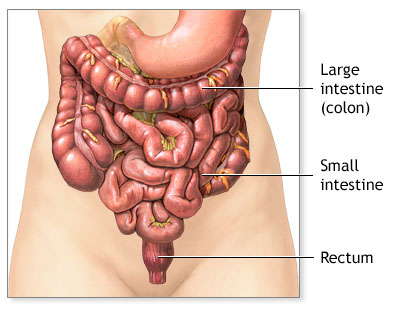Crohn's disease
What is Crohn's disease?
Crohn's disease is an IBD that causes ulcers to form in the gastrointestinal (GI) tract anywhere from the mouth to the anus. Crohn’s disease can have “skip” areas that are normal, in between areas that are affected. Some people who have Crohn's disease have severe symptoms, while others have less severe symptoms. Some people who have the disease have long periods without symptoms, even without getting treatment. Others with more severe disease will need long-term treatment or even surgery.
Symptoms
What are the symptoms of Crohn’s disease?
The symptoms of Crohn’s disease vary, depending on which part or parts of the gastrointestinal (GI) tract is affected. Common symptoms include the following:
- Diarrhea
- Stomach cramps
- Abdominal pain that comes and goes
- Blood in your stool
- Low appetite
- Unintended weight loss

Other less common symptoms may include fever, joint pain, eye problems, skin problems, and feeling tired (called fatigue). The symptoms of Crohn’s disease may be mild or severe. Symptoms may also come and go. They can start suddenly or gradually.
What are the symptoms of ulcerative colitis?
Symptoms of ulcerative colitis vary depending on how severe your case is and how much of your large intestine is affected. Common symptoms include the following:
- Rectal pain or bleeding
- Frequent, small bowel movements
- Feeling an urgent need to have a bowel movement
- Diarrhea
- Blood in the stool
- Abdominal cramping and pain
- A strong feeling that you need to have a bowel movement, but not being able to do so (called tenesmus)
- Pain on the left side of the abdomen
- Unintended weight loss
- Fatigue
In most people who have ulcerative colitis, these symptoms tend to come and go. You may have periods where you have no symptoms, followed by periods where you do have symptoms.
Causes & Risk Factors
What causes Crohn's disease and ulcerative colitis?
It is not yet known exactly what causes these inflammatory bowel diseases. These diseases seem to run in families, which means that genetics may play a role. Many researchers believe that inflammatory bowel diseases are caused by a problem with the immune system. Normally, the immune system protects your body from infection. In people who have an inflammatory bowel disease, the immune system mistakes food, healthy bacteria, and other substances for an infection. This causes the immune system to attack the cells of the intestine, which leads to inflammation.
Diagnosis & Tests
How is inflammatory bowel disease diagnosed?
Your doctor will give you a physical exam and listen to you describe your symptoms. To help diagnose your problem your doctor may order a number of tests, including blood tests and stool samples. Your doctor may also order one or more procedures to help him or her view your colon. In lower GI endoscopy procedures such as colonoscopy and flexible sigmoidoscopy, your doctor uses a narrow, flexible tube to look directly inside your large intestine. Upper GI endoscopy allows a look at your stomach and small intestine for ulcers. For this type of endoscopy, you either swallow a small camera (called capsule endoscopy) or your doctor inserts scope into your GI tract through your mouth.
Your doctor may also order other imaging tests such as X-rays, a CT scan or an MRI.
Treatment
How is inflammatory bowel disease treated?
The goal of treatment is to get rid of the inflammation that causes your symptoms. Many types of medicine can help reduce inflammation, including anti-inflammatory drugs and drugs that suppress the immune system. Depending on your symptoms, your doctor may also recommend an antibiotic, anti-diarrheal, laxative, pain reliever or vitamin supplements. In severe cases of inflammatory bowel disease, you may need to go to the hospital for intravenous (IV) fluids or surgery.
During your treatment, you will most likely be treated by a team of doctors. This team may include your family physician, a gastroenterologist (a specialist in stomach and intestinal disorders) and, possibly, a surgeon.
What can I do to help relieve my symptoms?
The best thing you can do is to take good care of yourself. It's important to eat a healthy diet. Depending on your symptoms, your doctor may ask you to cut down on the amount of fiber or dairy products in your diet. It also may be necessary to limit or avoid caffeine, alcohol, and carbonated beverages. In addition to eating well, you need to get enough rest and exercise regularly. It's also important that you learn to manage the stress in your life. When you become overly upset by things that happen at home or at work, your intestinal problems can get worse.
How can I get more information?
By asking questions, reading informational materials and discussing your treatments with your doctor, you'll be able to understand your illness and manage it better. Patient support groups are helpful, especially if you have severe disease.
Complications
Am I at risk for other problems due to inflammatory bowel disease?
If you have inflammatory bowel disease, you are at an increased risk of colon cancer. Talk to your doctor about when to start screening for colon cancer and how often to have screening.
Because Crohn's disease and ulcerative colitis keep coming back and their symptoms cannot be predicted ahead of time, patients who have these illnesses can become depressed. If you feel depressed, talk with your family doctor. An antidepressant medicine could help you feel better.
Other Organizations
- Crohn's and Colitis Foundation of America
- National Digestive Diseases Information Clearinghouse
Questions to Ask Your Doctor
- How will my inflammatory bowel disease be treated?
- Will I need surgery? Are there other options?
- What lifestyle changes can I make to help inflammatory bowel disease?
- What are some medicines used to treat inflammatory bowel disease and what are the possible side effects?
- Are my children at risk of inflammatory bowel disease?

